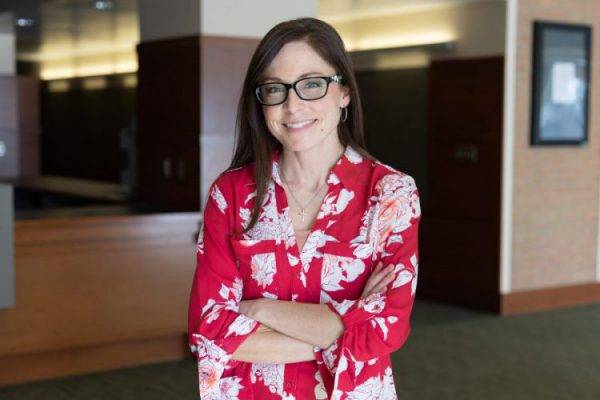
Interested in the faculty members behind our programs? Get to know them through our monthly faculty spotlight.
Faculty Spotlight: Jennifer Bueby, OTD, OTRL
Jennifer Bueby is the Academic Fieldwork Coordinator and Assistant Professor at Concordia University of Ann Arbor. She has studied occupational therapy, the brain, behaviorism, and cognitive science.
She began working at Concordia part time in November of 2020 and became a full-time faculty member as of February of 2021. Since then, Dr. Bueby has been assisting with the development of the OT program at CUAA with the goal to support successful student outcomes and work with students to improve their confidence in learned OT skills. She has also been working with the PROSPER program to support undergraduate student success.
Why did you choose Concordia?
I was excited by the opportunity to work in a Christ-centered environment while educating future occupational therapists!
What do you love about Concordia?
Everyone I have encountered at CUAA has been kind, welcoming, and supportive. They truly care about each faculty member, staff, and student who makes up this campus family.
What are your goals for your program?
I look forward to creating experiences for students that helps them bridge the gap between learning in the classroom and application of skills in the field through community engagement. I want to support students as they become compassionate, prepared, and critical thinking occupational therapists and servant leaders.
What’s the one key lesson from your work that you hope students take away from interacting with you?
The compassion, interest, and empathy you show your future clients is a way to minster and show Christ’s love.
What should your students take away from this program?
Serving others and aiding people in fulfilling the desires of their hearts are some of the most rewarding things they will encounter working in occupational therapy. It may be difficult and it will require time, effort, and patience, but it is so incredibly worth it.
What’s your education and career background?
I earned my Bachelor’s of Science in Brain, Behavior, and Cognitive Sciences from the University of Michigan. I earned my Master’s of Science in Occupational Therapy from Dominican University in California. Lastly, I earned my Doctorate in Occupational Therapy from Chatham University. I have worked as an occupational therapist for almost 10 years in various settings that include: home care/hospice, inpatient/acute rehab, neuro-rehabilitation, and chronic pain management. I have served as a clinical fieldwork educator to students in each setting I have worked.
What are some of your career highlights?
Earning my doctorate while working full-time, and having a book review published in my first year as a full-time faculty member.
What’s the most interesting part of your field that the public might not know?
Think of everything you have to do and everything you find joy in doing (occupations)…imagine something made it more difficult (physically, mentally, emotionally) for you to do those things. Occupational therapy can work with anyone, anywhere, at any age, to help them overcome barriers in their mind, body, and/or spirit to find joy and purpose in the things they do every day.
If you feel a calling to help people and you want to be able to make an impact treating all aspects of a person’s life, occupational therapy may be just the path for you.
What do you like to do for fun?
I love to do difficult jigsaw puzzles, garden, and travel.
Why should students study your program?
If you feel a calling to help people and you want to be able to make an impact treating all aspects of a person’s life, occupational therapy may be just the path for you. The faculty and staff in the CUAA OT program each have a heart for enabling students to learn and grow their passion for serving others. We love what we do! Through classroom instruction, simulation, and community-based opportunities, students truly learn how to use what they learn, while they are learning it, so they may feel confident and empowered when they begin to treat patients as a professional.
Why should students consider coming to Concordia?
Concordia provides a supportive, small-campus environment while also being in a large college-town with cultural experiences and much to do! Something just feels different here. The student body is a big family and the faculty really care about the success of the students. Our programs and educational opportunities continue to grow to enable students to engage in and fulfill their vocational calling.
Do you want to know more?
If you’re interested in learning more about life at Concordia University Ann Arbor, visit us here.
—
If this story has inspired you, why not explore how you can help further Concordia's mission through giving.